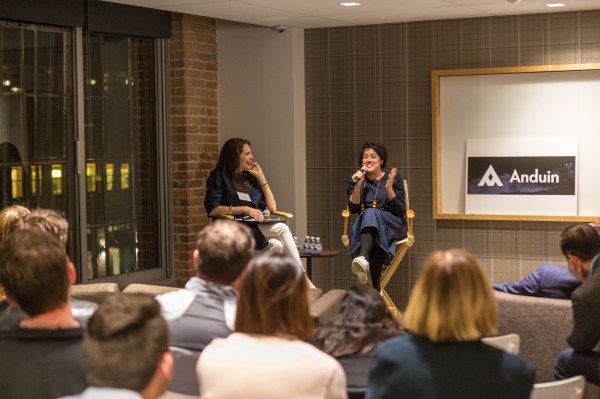Ten years ago, not long after Yahoo had acquired Flickr, its co-founder, Caterina Fake, bounded up and down Sand Hill Road taking meetings with venture firms that were interested in hiring her. She knew most of them. In fact, she already knew a lot of investors at that point. Flickr was created out of a photo-sharing feature for another product that Fake and co-founder Stewart Butterfield had been working on that she calls “an abysmal failure.” And “when you have a failed pitch,” says Fake, “you meet many more venture capitalists than you really want to.”
When Flickr was acquired — as Fake told an audience of founders and investors at a StrictlyVC event earlier this week — “I figured I’d have a sniff around and see, ‘Is this my world? Would I like it? Is venture for me?’ I never really considered this as a career opportunity.” The answer became apparent pretty quickly. “I’d go in and it was like, ‘One of these things is not like the other.’ I’d look around at all of these dudes and I was like, ‘I don’t know if this is for me. I’m feeling like this is not my place… I don’t dress like y’all. I have an English degree. I just kind of didn’t fit in.’ ”
It’s because “everything has changed since then — everything,” she says, that Fake, who has co-founded four companies altogether, is now jumping into the venture game full time. As we reported in January, after years of investing as an individual — including in Etsy (whose board she chaired for many years), Kickstarter and Coursera — Fake and partner Jyri Engeström are currently raising up to $50 million from institutions and family offices, including that of Nokia’s chairman Risto Siilasmaa.
She has largely been inspired by the growing number of women in both entrepreneurship and venture capital, suggested Fake. But her interest in turning pro, so to speak, seems even more rooted in the faith that Fake has in her own instincts. It paid off with Etsy, for example, which she recognized early as part of a burgeoning social movement toward craftsmanship and away from big-box retail, whereas “people in the Valley” that she introduced to the deal “were like, ‘So this is a bunch of people knitting and selling scarves?’ ”
Right now, Fake said she sees an opportunity to get in front of the next parade, which is headed our way courtesy of the very public backlash against social media.
Explained Fake, “Over the past decade, when you looked at the social environment online and the great hegemony of Facebook and kind of owning your social existence, that was frankly very discouraging for a lot of us [who helped build early online communities]. And part of the reason that I’m back in the fray and out there investing is because I see it breaking apart. I see this illusion — that it was outside of and separate from society, democracy, civic life — breaking down … I feel very much as if we’re undergoing a major change in that regard, and to me, when things are falling apart and breaking up, there’s just so much room for opportunity.”
Playing host at the event, we asked Fake — who specializes in pre-seed and seed-stage deals — how she explains to limited partners how she operates. “In a low EQ world, it’s handy to have a high EQ,” she said, recounting a meeting with Etsy founder Rob Kalin at his Brooklyn apartment after he pitched her on his idea. “Rob was covered in cat hair. He had no hot water in his apartment. But I totally believed him when he told me Etsy was going to be as big as eBay. There was just something about this guy that I believed was unstoppable — a special entrepreneur gene that’s rare — and I was immediately like, ‘How can I write a check to this guy?’ ”
Kickstarter was another “leap in the dark,” she said. “I invested when it was literally a PowerPoint deck and two guys — neither of whom had any experience. Perry [Chen] was a day trader, and Yancey [Strickler] was a waiter at the restaurant where Perry took a break every day. But I loved Kickstarter when I looked at it. It needed to exist.”
Before we let Fake go, we talked with her about selling two of her companies, and the widespread belief in entrepreneurial circles that selling is somehow failing. Fake joked that she loves IPOs, too, but she noted that going public is rarely a company’s destiny. “Trade sales are the bulk of exits, and there’s no shame in that. Sometimes, it’s exactly the right thing to do.
“You see companies that have had acquisition interest and didn’t take [the deal] and kind of dwindle and die and it’s a missed opportunity,” said Fake. “And part of it is this heroics in entrepreneurship where [the thinking is that], ‘We’re going to shoot for the moon and IPO and that’s the only way.’ So much of that culture is damaging to the thread through the company itself. You don’t necessarily need to go in that direction, because it [confers] the most glory. Do not seek prizes that aren’t worth getting.”
